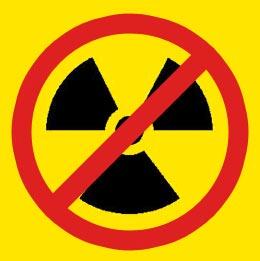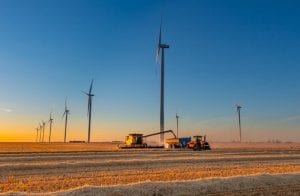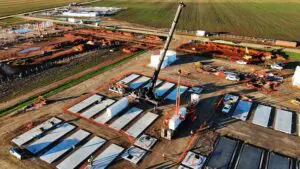Japan decided to join the “no-nuclear” club last week, bowing to public aversion to these plants after the Fukushima accident in March 2011. At the same time, it projected significant investments in renewable energy.
Japan will have no nuclear power by the end of the 2030s, according to the new energy policy approved by Prime Minister Yoshihiko Noda on 14 September. Idled reactors will however be allowed to restart during the 27-year wind-down period. On the flip side, the policy also envisages investment of JPY 38 trillion (USD 487bn) on solar, wind and other types of renewable energy over the next two decades, with an additional JPY 84 trillion investment in energy-efficient technology.
Japan has already introduced what are seen as fairly generous feed-in tariffs for renewable energy, beginning 1 July 2012. There have been multiple announcements of projects subsequently. Two large renewable power initiatives were announced last week: a 1GW wind farm with 500 turbines on the island of Hokkaido, to be developed by telcommunications company Softbank, and a 250MW solar project backed by the Goldman Sachs Group, IBM, Nippon Telegraph and Telephone and Toyo Engineering, among others. Bloomberg New Energy Finance estimates that about 900MW of utility-scale solar projects – or those larger than 1MW – have been announced this year, of which 350MW are already under construction.
In Europe, France was also looking at energy and emissions, decades ahead. President Francois Hollande said he favoured a 40 per cent cut in emissions from the EU bloc by 2030 from 1990 levels, and to 60 per cent by 2040. The current target is to lower carbon emissions by 20 per cent from 1990 levels by 2020.
Increasing the use of renewable energy and reducing emissions is not only the goal of governments, but individual companies too. A report by the London-based non-profit Carbon Disclosure Project showed that Bayer and Nestle are at the top of the list of companies that measure and cut emissions. PricewaterhouseCoopers co-authored the report, which included Spanish utility Gas Natural, BMW, BASF, Diageo, Nokia, Allianz, UBS and Panasonic in its top-10 list. The CDP requested data from the biggest 500 companies by market capitalisation in the FTSE Global Equity Index Series. A total of 405 businesses supplied the information, though the report is based only on the 379 that replied by 31 July.
A separate study on the largest users of renewable energy, commissioned by Vestas, showed that Japan’s OJI Paper is the biggest corporate user of renewable power. The German building materials company Sto was second on the list, and was followed by the Finnish pulp and paper company UPM-Kymmene in the Carbon Renewable Energy Index or CREX, prepared by Bloomberg New Energy Finance.
A total of 36 companies out of 389 in the index sourced 100 per cent of their power from renewables, including Adobe Systems, Kohl’s and Whole Foods Market.
On another track, trade friction continued between China and the US on one hand and between China and Europe on the other, though the world’s second largest economy chose to deal very differently with the two. According to Xinhua news agency, China is in favour of a dialogue with the EU to resolve the dispute over solar panels. The 27-nation bloc initiated a probe into alleged dumping of solar panels by China on 6 September. The inquiry covers EUR 21bn (USD 27bn) of imports of crystalline silicon PV modules and cells and wafers used in them.
“Dialogue is the best approach to solving the dispute,” Xinhua cited Chong Quan, deputy representative for China’s international trade talks and a senior official at the ministry of Commerce, as saying in Brussels. The EU should pay attention to the “over 200,000 jobs” created in its PV system installations by China’s solar panel exports, and also its export to China of solar raw materials and technological equipment worth tens of billions of US dollars, Xinhua cited Chong as saying.
China’s envoy to the EU, Wu Hailong, was more strident when he said earlier in the week that such probes are “not constructive” and can be a “double-edged sword” for European businesses that supply Chinese manufacturers.
A sharp jab for the renewable energy industry came from Spain, where the government approved a draft bill to impose a flat tax of 6% on revenue from electricity generation from all sources.
EU AND UN CARBON PLUMMET AS REGULATORS BOOST SUPPLY
European carbon allowances, or EUAs, for December 2012 delivery sank 11.1% last week, after regulators indicated that a new series of post-2012 allowances will be auctioned around the end of October. EUAs ended Friday’s session at EUR 7.45/t, compared with EUR 8.38/t at the close of the previous week. They lost EUR 0.54/t on the first day of trading after a European Commission announcement on Monday morning indicated that common auctions will begin late October, with Germany potentially starting its sales a few weeks earlier than that, and the UK in November. EUAs were dragged further down on Monday by news that the Netherlands is unlikely to support a set-aside plan to curb oversupply in the market. United Nations Certified Emission Reductions, or CERs, for December 2012 crashed 30% last week to a record low of EUR 1.68/t, after the Clean Development Mechanism Executive Board approved on Thursday a revised set of rules that may boost supply in the market. The rules govern how many emission credits new natural gas- and coal-powered generators are eligible to receive in emerging and developing nations.
For information on how to subscribe to Bloomberg New Energy Finance’s daily news, data and analysis on clean energy and carbon markets, click here.
WATER PROJECTS IN TURKEY AND MIDDLE EAST
Turkey said it is working on a USD 700m dam and subsea pipeline to supply fresh water to northern Cyprus. In neighbouring Bulgaria, the EU approved funding for a USD 62m wastewater treatment plant and sewage system in the southeastern city of Yambol. In the Middle East, Saudi Arabia signed 21 contracts valued at USD 118m for water and sanitation projects, while Kuwait signed two maintenance contracts worth USD 64m for power and water desalination plants in west and east Doha. In Europe, London-based Ludgate Investments is seeking to raise up to USD 300m to finance waste-recycling and water-treatment businesses through a second resource-efficiency fund. Austrian water-purification equipment maker BWT said the private trust controlled by chief executive officer Andreas Weissenbacher is making a mandatory takeover offer that values the company at EUR 285m (USD 371m). In the Americas, Acciona said it will build and operate a USD 45m wastewater treatment plant in Costa Rica, which will serve at least 1m people in the capital San Jose, making it the country’s biggest. Jamaica approved a USD 18m contract with Kier Construction for water system upgrades in Kingston and St Andrew, part funded by the Inter-American Development Bank. In the US, Heckmann Corporation said it acquired a majority stake in Appalachian Water Systems, without giving terms of the deal.










